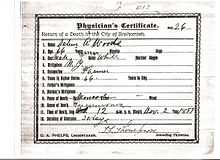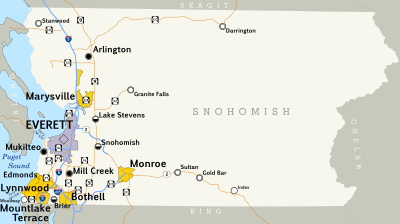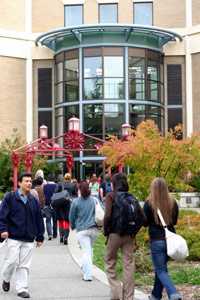Snohomish County, Washington
| Snohomish County, Washington | |||
|---|---|---|---|
 Snohomish County Government Campus in Everett | |||
| |||
 Location in the state of Washington | |||
 Washington's location in the U.S. | |||
| Founded | January 14, 1861 | ||
| Named for | Snohomish Indian Tribe | ||
| Seat | Everett | ||
| Largest city | Everett | ||
| Area | |||
| • Total | 2,196 sq mi (5,688 km2) | ||
| • Land | 2,087 sq mi (5,405 km2) | ||
| • Water | 109 sq mi (282 km2), 5.0% | ||
| Population (Est.) | |||
| • (2012) | 733,036 | ||
| • Density | 341/sq mi (131.8/km²) | ||
| Time zone | Pacific: UTC-8/-7 | ||
| Website | www1.co.snohomish.wa.us | ||
Snohomish County /snɵˈhoʊmɨʃ/ is a county located in the State of Washington. As of the 2010 census, the population was 713,335,[1] making it the third-most populous county in Washington. The county seat and largest city is Everett.[2] The county was created out of Island County on January 14, 1861[3] and is named for the Snohomish tribe.
Snohomish County is included in the Seattle metropolitan area.
Etymology
Snohomish is the name of a Native American tribe in the area. Some associate the word as meaning "land of the low people".
History

Snohomish County was created out of Island County on January 14, 1861.[3]
The county seat of Snohomish when established was the city of Snohomish, Washington starting in 1861.[4] The city of Everett took the seat in a disputed move in 1895. It was in a vote.[5]
One of the first county censuses was taken in 1862 by Sheriff Salem A. Woods.
Early important pioneers in the Snohomish County region included E. F. Cady of Snohomish, E. C. Ferguson of Snohomish and Isaac Cathcart.
Geography

According to the 2010 census, the county has a total area of 2,196 square miles (5,690 km2), of which 2,087 square miles (5,410 km2) is land and 109 square miles (280 km2) (5.0%) is water.[6]
Snohomish County is located in the western part of Washington, about halfway between the state's north and south borders. Possession Sound and Puget Sound define the county's western border, while the eastern border is defined by the summits of the Cascade Range. Four counties are adjacent to Snohomish County: Skagit County to the north, Chelan County to the east, King County to the south, and Island County to the west.
The county's surface is covered by plains in the west and mountainous terrain in the east. The Cascade Range passes through the eastern part of the county and includes the highest point in Snohomish County, Glacier Peak at 10,541 feet (3,212.90 m) above sea level. Most of the eastern part of the county is preserved by the Mount Baker National Forest and Snoqualmie National Forest, which are consolidated into the Mount Baker-Snoqualmie National Forest. The mountains provide a source for several major rivers in the east, including the Snohomish, Snoqualmie, and Stillaguamish, that in turn form major bodies of water to the west.
Transportation
Roads
Snohomish County has five major routes that connect the county to the other counties and other areas. There are four north-south routes, which are Interstate 5, Interstate 405, State Route 9, and State Route 99. The only complete east-west route is U.S. Route 2.
 Interstate 5
Interstate 5 Interstate 405
Interstate 405 U.S. Route 2
U.S. Route 2 State Route 9
State Route 9 State Route 92
State Route 92 State Route 96
State Route 96 State Route 99
State Route 99 State Route 104
State Route 104 State Route 203
State Route 203 State Route 204
State Route 204 State Route 522
State Route 522 State Route 524
State Route 524 State Route 525
State Route 525 State Route 526
State Route 526 State Route 527
State Route 527 State Route 528
State Route 528 State Route 529
State Route 529 State Route 530
State Route 530 State Route 531
State Route 531 State Route 532
State Route 532- Primary State Highway 1
- Primary State Highway 15
Buses and trains
Snohomish County is linked by many bus routes from three systems, which are Community Transit, Everett Transit (Everett only), and Sound Transit. The county also has train access from Everett Station for Amtrak's Empire Builder line (to Chicago), and Cascades line (to Vancouver, BC, Edmonds, and Seattle), and Sound Transit's Sounder service to and from Seattle, which links to the South Line that goes to Tacoma.[7]
Community Transit is operates a bus rapid transit service called Swift from Everett Station to the Aurora Village in Shoreline along the SR 99 corridor. Sound Transit is also planning to extend Link Light Rail service to Lynnwood and eventually Everett.[8] The line will be known as the North Link.
Airplanes and ferries
Snohomish County has one official airport and several municipal airports. The county also is connected by two ferry lines operated by Washington State Ferries.
The one official airport is Paine Field, otherwise known as Snohomish County Airport. There are smaller outlying airports, such as Harvey Field in Snohomish. There are two municipal airports, Arlington Municipal and Darrington Municipal. There are also two private airports, one in Lake Stevens and another in Granite Falls. The Martha Lake Airport in Martha Lake was a former private airport that was closed in 2000.[9]
As said in the introduction above, there are two ferry routes operated by Washington State Ferries in Snohomish County waters that go to and from different counties from the county.[10] The first line is the Edmonds-Kingston route, which carries SR 104. SR 104 terminates in the west at US 101 west of the Kitsap Peninsula, after crossing the Hood Canal over the Hood Canal Bridge. SR 104 terminates in the east at Interstate 5 on the county boundary with King County.[11] The second line is the Mukilteo-Clinton line, which carries SR 525. SR 525 terminates in the west at SR 20 on Whidbey Island, near where SR 20 goes across on another ferry line to US 101. SR 525 terminates in the east at an interchange with Interstate 5, where it continues as Interstate 405.[12]
Education

Snohomish County is one of the most-populous counties in the United States without a four-year, baccalaureate degree-granting institution.[13]
Everett Community College and Edmonds Community College provide academic transfer degrees, career training and basic education in Snohomish County. Together, the two serve more than 40,000 people annually. About 40 percent of all high school graduates in Snohomish County begin their college education at Edmonds or Everett community college.
Everett Community College is the legislatively appointed leader of the University Center of North Puget Sound, [14] which offers 25 bachelor's and master's degrees through Western Washington University, Washington State University, Central Washington University, Eastern Washington University, The Evergreen State College, Hope International University, and the University of Washington Bothell.
Edmonds Community College and Central Washington University have worked together since 1975 to provide higher education in Snohomish County. After earning a two-year degree online or on campus from Edmonds Community College, students can continue their studies for a bachelor's degree from Central Washington University-Lynnwood in Snoqualmie Hall, a shared building on the Edmonds CC campus.
Demographics
| Historical population | |||
|---|---|---|---|
| Census | Pop. | %± | |
| 1870 | 599 | ||
| 1880 | 1,387 | 131.6% | |
| 1890 | 8,514 | 513.8% | |
| 1900 | 23,950 | 181.3% | |
| 1910 | 59,209 | 147.2% | |
| 1920 | 67,690 | 14.3% | |
| 1930 | 78,861 | 16.5% | |
| 1940 | 88,754 | 12.5% | |
| 1950 | 111,580 | 25.7% | |
| 1960 | 172,199 | 54.3% | |
| 1970 | 265,236 | 54.0% | |
| 1980 | 337,720 | 27.3% | |
| 1990 | 465,642 | 37.9% | |
| 2000 | 606,024 | 30.1% | |
| 2010 | 713,335 | 17.7% | |
| Est. 2012 | 733,036 | 2.8% | |
1790-1960[16] 1900-1990[17] 1990-2000[18] 2010-2012[1] | |||
As of the census[19] of 2000, there were 606,024 people, 224,852 households, and 157,846 families residing in the county. The population density was 290 people per square mile (112/km²). There were 236,205 housing units at an average density of 113 per square mile (44/km²). The racial makeup of the county was 85.63% White, 1.67% Black or African American, 1.36% Native American, 5.78% Asian, 0.28% Pacific Islander, 1.92% from other races, and 3.36% from two or more races. 4.72% of the population were Hispanic or Latino of any race. 16.2% were of German, 10.0% English, 8.8% Irish, 8.4% Norwegian and 6.6% United States or American ancestry.
There were 224,852 households out of which 37.30% had children under the age of 18 living with them, 56.00% were married couples living together, 9.80% had a female householder with no husband present, and 29.80% were non-families. 22.60% of all households were made up of individuals and 6.50% had someone living alone who was 65 years of age or older. The average household size was 2.65 and the average family size was 3.13.
In the county, the population was spread out with 27.40% under the age of 18, 8.50% from 18 to 24, 33.00% from 25 to 44, 22.00% from 45 to 64, and 9.10% who were 65 years of age or older. The median age was 35 years. For every 100 females there were 100.10 males. For every 100 females age 18 and over, there were 98.20 males.
The median income for a household in the county was $53,060, and the median income for a family was $60,726. Males had a median income of $43,293 versus $31,386 for females. The per capita income for the county was $23,417. About 4.90% of families and 6.90% of the population were below the poverty line, including 7.60% of those under age 18 and 7.80% of those age 65 or over.
Law/government
County Executive
The county executive is John Lovick, a Democrat. Lovick is a former Sheriff of Snohomish County and took office as county executive on June 3, 2013.[20] He was appointed by the Snohomish County Council to succeed Aaron Reardon, who resigned amid allegations of misuse of county resources and an extramarital affair.[21]
The county executive seat was chartered in the 1979.[22] The first county executive was conservative Democrat[22] Willis Tucker of Snohomish from 1980 to 1991.[22] Following Tucker, the next county executive was Democrat[23] Bob Drewel from 1991 to 2002,[22][24] followed by Democrat Aaron Reardon from 2003 to 2013.[21]
County Council
The county council is made up of:[25]
- John Koster (R) - district 1
- Brian Sullivan (D) - district 2
- Council Chair Stephanie Wright (D) - district 3
- Dave Gossett (D) - district 4
- Vice-Chairman Dave Somers (D) - district 5
Koster and Sullivan are both former state representatives. In the 2010 state elections, Koster narrowly lost to Rick Larsen in an election for U.S. Representative seat 2.[26]
Communities
Cities and towns
- 104,655 - Everett
- 62,402 - Marysville
- 40,400 - Edmonds
- 36,275 - Lynnwood
- 34,651 - Bothell (partial)
- 29,104 - Lake Stevens
- 20,605 - Mukilteo
- 20,198 - Mountlake Terrace
- 18,671 - Mill Creek
- 18,317 - Arlington
- 17,503 - Monroe
- 9,275 - Snohomish
- 6,422 - Stanwood
- 6,251 - Brier
- 4,715 - Sultan
- 3,421 - Granite Falls
- 2,089 - Gold Bar
- 1,359 - Darrington
- 1,322 - Woodway
- 184 - Index
2012 Estimate population[27]
Census-designated places
- Alderwood Manor
- Arlington Heights
- Bothell East
- Bothell West
- Bryant
- Bunk Foss
- Canyon Creek
- Cathcart
- Cavalero
- Chain Lake
- Clearview
- Eastmont
- Esperance
- Fobes Hill
- Hat Island
- High Bridge
- Lake Bosworth
- Lake Ketchum
- Lake Roesiger
- Lake Stickney
- Lochsloy
- Machias
- Maltby
- Martha Lake
- May Creek
- North Marysville
- North Sultan
- Northwest Stanwood
- Oso
- Silvana
- Silver Firs
- Startup
- Sunday Lake
- Swede Heaven
- Three Lakes
- Verlot
- Warm Beach
- Woods Creek
Other communities
- Elger Bay
- Kennard Corner
- North Lakewood
- Queensborough
- Trafton
See also
Footnotes
- ↑ 1.0 1.1 "State & County QuickFacts". United States Census Bureau. Retrieved January 7, 2014.
- ↑ "Find a County". National Association of Counties. Retrieved 2011-06-07.
- ↑ 3.0 3.1 "Milestones for Washington State History — Part 2: 1851 to 1900". HistoryLink.org. March 6, 2003.
- ↑ "Historical Development of Snohomish". Ci.snohomish.wa.us. Retrieved 2013-06-20.
- ↑ Smith, Debra (2011-01-02). "Divers may have found ship built in Everett in 1894 | HeraldNet.com - Local news". HeraldNet.com. Retrieved 2013-06-20.
- ↑ "US Gazetteer files: 2010, 2000, and 1990". United States Census Bureau. 2011-02-12. Retrieved 2011-04-23.
- ↑ Sounder Commuter Rail
- ↑ "Lynnwood Link Extension". Projects.soundtransit.org. 2013-04-08. Retrieved 2013-06-20.
- ↑ List of airports in Washington
- ↑ Washington State Ferries#Routes
- ↑ Washington State Route 104
- ↑ Washington State Route 525
- ↑ Stephanson, Ray (April 4, 2007). "UW branch a sound option". The Seattle Times
- ↑ uceverett.org
- ↑ "U.S. Decennial Census". United States Census Bureau. Retrieved January 7, 2014.
- ↑ "Historical Census Browser". University of Virginia Library. Retrieved January 7, 2014.
- ↑ "Population of Counties by Decennial Census: 1900 to 1990". United States Census Bureau. Retrieved January 7, 2014.
- ↑ "Census 2000 PHC-T-4. Ranking Tables for Counties: 1990 and 2000". United States Census Bureau. Retrieved January 7, 2014.
- ↑ "American FactFinder". United States Census Bureau. Retrieved 2011-05-14.
- ↑ "Lovick Sworn In as New Snohomish County Executive". Snohomish County. Retrieved 3 June 2013.
- ↑ 21.0 21.1 Heffter, Emily (February 21, 2013). "Embattled Snohomish County executive stepping down". Seattle Times. Retrieved February 21, 2013.
- ↑ 22.0 22.1 22.2 22.3 Brooks, Diane (July 2, 2000). "Willis Tucker Obituary: He led his county into new age with a smile". Seattle Times. Retrieved 5 January 2011.
- ↑ "Building renamed for Bob Drewel". The Seattle Times. November 7, 2007.
- ↑ Stevick, Eric (2008). "Former County Executive Bob Drewel honored with building". The Everett Herald.
- ↑ "Snohomish County : Council Districts : Home". .co.snohomish.wa.us. 2013-04-11. Retrieved 2013-06-20.
- ↑ Cornfield, Jerry (2010-11-23). "Larsen won the race, but Koster leads in candidates' hometown | HeraldNet.com - Local news". HeraldNet.com. Retrieved 2013-06-20.
- ↑ "Incorporated Places and Minor Civil Divisions: Washington". Population Census. United States Census Bureau. 2013-09-26. Retrieved 2013-09-26.
Further reading
- Jonathan Stuart Burr, Organized Labor's Influence on Local Elections: A Case History of Snohomish County, Washington. Master's thesis. Columbus State University, 2005.
- An Illustrated History of Skagit and Snohomish Counties, Washington, Their People, Their Commerce and Their Resources: With an Outline of the Early History of the State of Washington. Chicago: Interstate Publishing Co., 1906.
- Journal of Everett & Snohomish County History, Everett Public Library, 1981-
External links
| Wikimedia Commons has media related to Snohomish County, Washington. |
- Official Snohomish County website
- Official Snohomish County Tourism Bureau
- Snohomish County Housing Authority (HASCO)
- Everett Housing Authority
- University of Washington Libraries Digital Collections – Lee Pickett Photographs Over 1400 photographs documenting scenes from Snohomish, King and Chelan Counties in Washington State from the early 1900s to the 1940s.
- A Clearview diarist on wikisource
- Sno-Isle Libraries
Archives
- Snohomish County Central Labor Council records. 1915-1999. Approximately 25 cubic feet. At the Labor Archives of Washington, University of Washington Libraries Special Collections.
Education links
 |
Skagit County |  | ||
| Island County | |
Chelan County | ||
| ||||
| | ||||
| King County |
| ||||||||||||||||||||||||||
| ||||||||||||||
| |||||||||||||||||||||||||||||||||||||||
Coordinates: 48°02′N 121°43′W / 48.04°N 121.71°W
